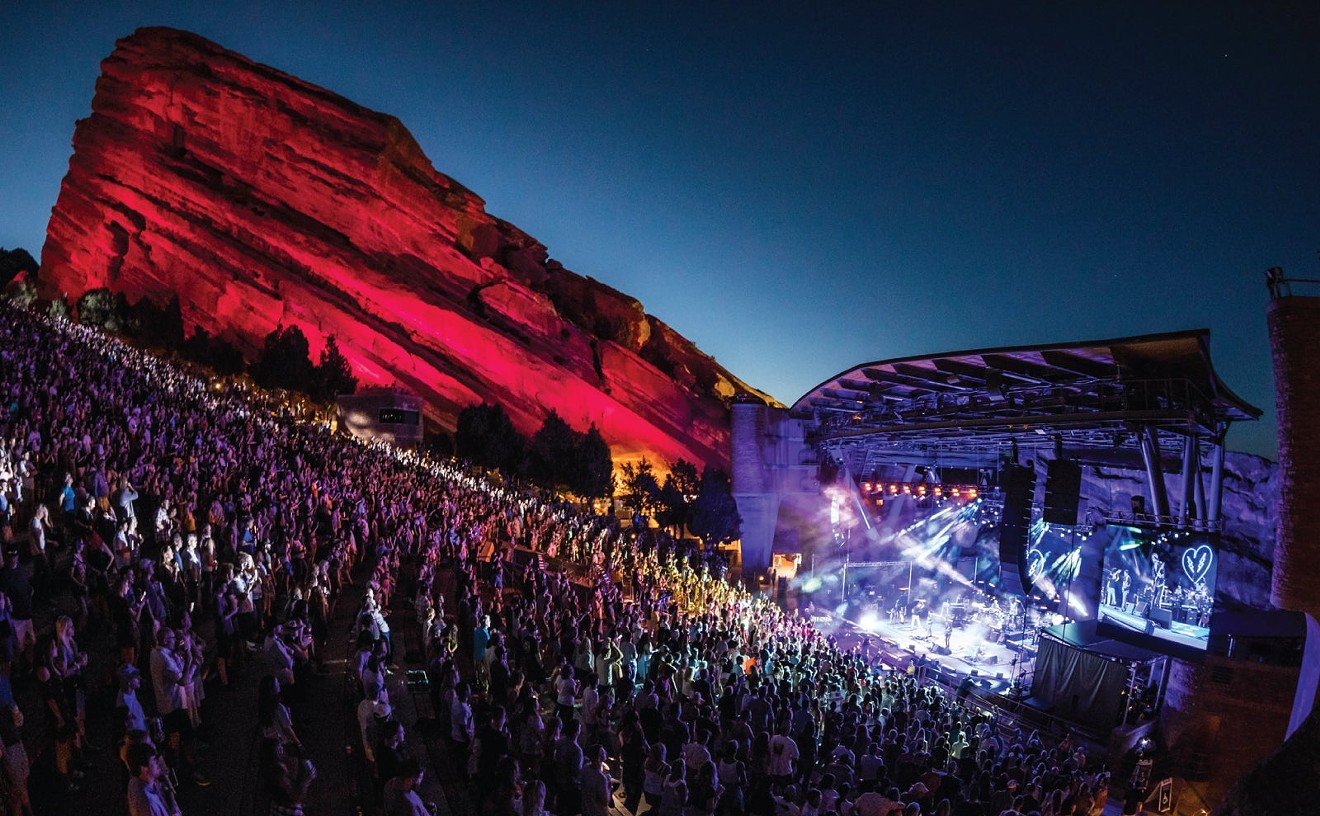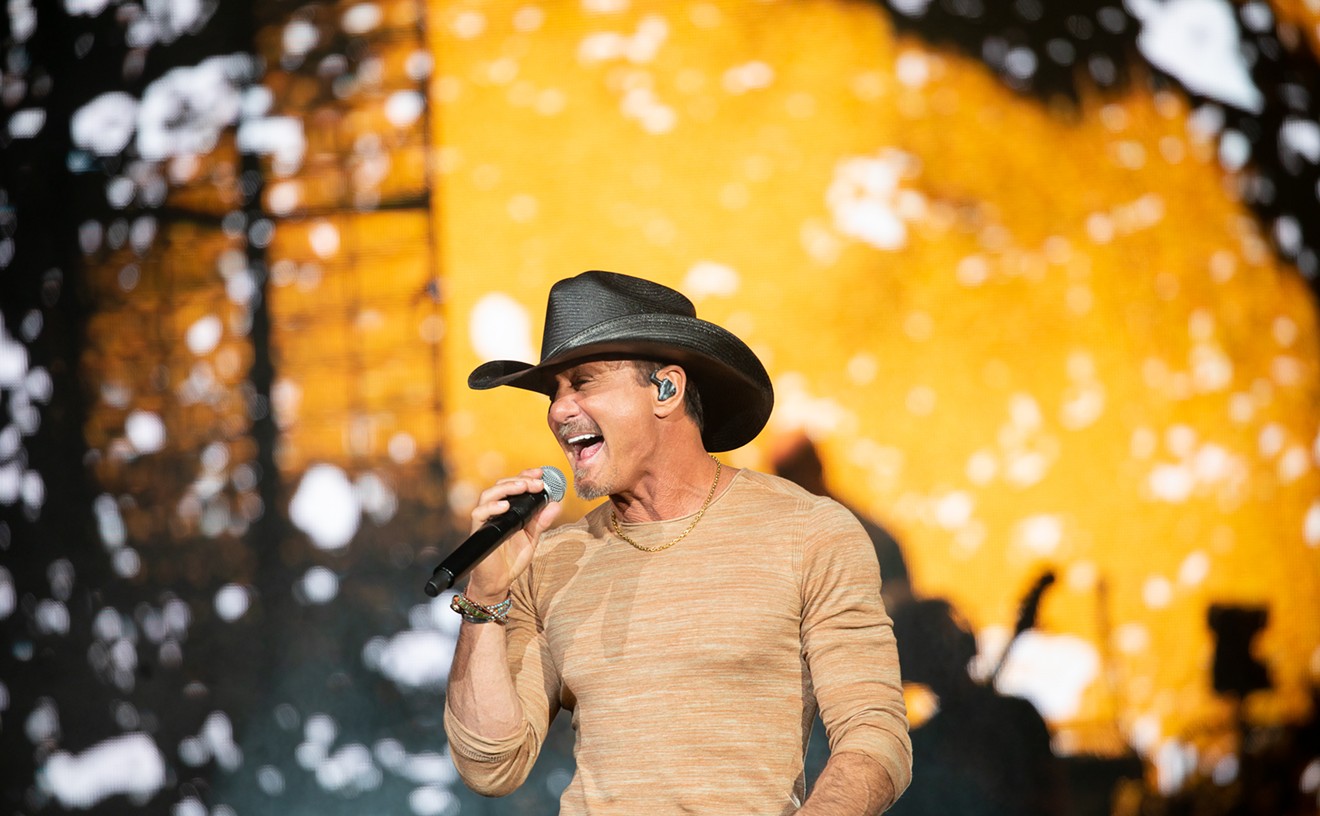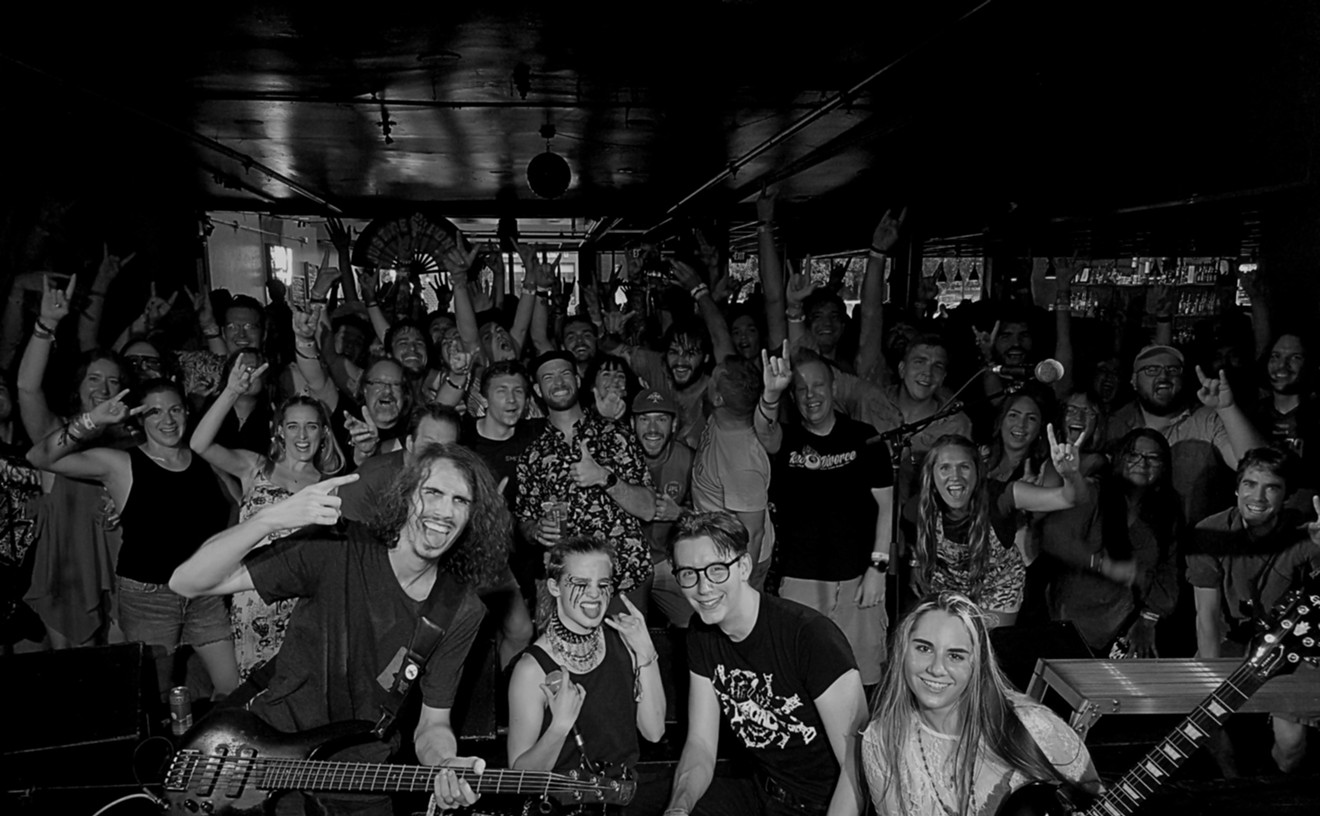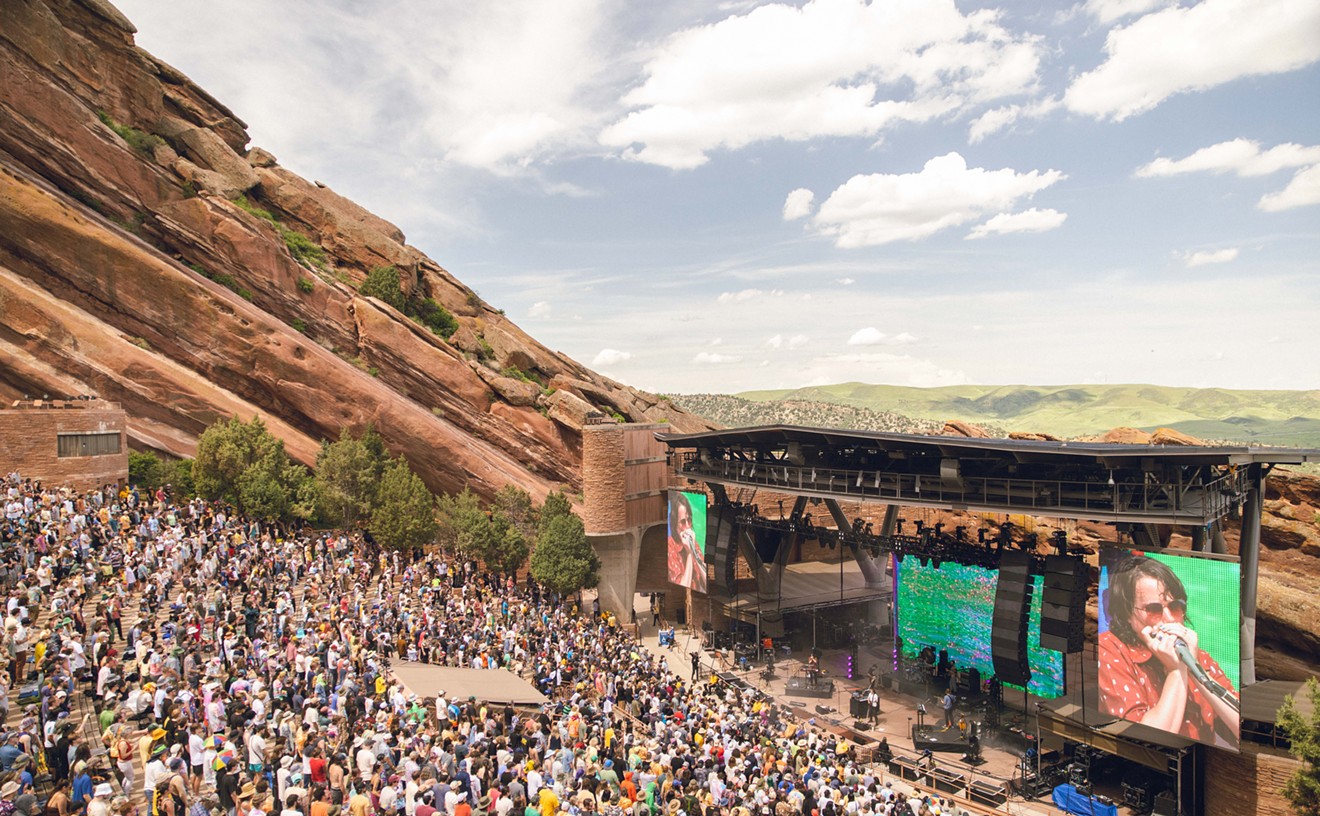On previous visits to Denver, renowned exploratory guitarist Fred Frith performed with John Zorn and Mike Patton, and with guzheng virtuoso Wu Fei and local guitarist Janet Feder, whom Frith has also recorded with. Those gigs displayed Frith's adventurous approach to the guitar, which he's been honing for more than five decades, with groups like Henry Cow, Art Bears and Massacre, collaborating with other avant-garde artists, as well as playing on his own. With his 1974 album, Guitar Solos, Frith essentially redefined the role of the guitar. As part of Creative Music Works Meet the Board Series, Frith and Feder team up again for a talk about the creative process on Friday, January 20 and a concert on Saturday, January 21. We spoke with Frith about his approach to the guitar and improvising.
You and Janet Feder have collaborated before, both performing and recording. How has it been working with her?
It’s always a pleasure. We’re very different from each other, which is always a challenge. Her version of the guitar is quite a bit different from mine. So, we actually fit together quite well because we don’t tend to trespass on each other’s territory, which is a problem I have sometimes playing with guitar players where it seems like we’re doing the same thing. So I get a lot of space with Janet to place myself around what she’s doing, and I guess she probably has the same feeling.
You were talking about your version of the guitar. What exactly is that?
Well, I’ve been playing the guitar for about 55 years. And since the beginning, I’ve kind of touched on almost everything: folk music and rock and roll and many other idiomatic paths that I’ve gone along. But starting when I was a student, when I was in my late teens, I started getting interested in sound experimentation because of reading John Cage, and so I started to slowly reimagine what the guitar could be in terms of it as a sound source rather than kind of an idiomatic, referential instrument, which it obviously is. One of the things about the guitar, which is both a wonderful thing and an awful thing, from my point of view, is that everybody can play one, and everybody has an opinion.
So, there it is. It’s the kind of universal instrument that everybody has got some experience of in picking out a song. So, you can’t escape from the familiarity that everybody has with the instrument. And I think what I’ve been doing has been exploring sound production, because an electric guitar, in particular, is nothing until you plug it in. The instrument isn’t really the thing you’re holding in your hand. It’s a combination between the instrument and the amplifier and whatever effects you decide to put it through. That’s your instrument.
One of the things that I like about improvising is that you can re-configure that, and so every time you play, you’re kind of re-inventing the instrument. You’re approaching it with new ears and the trick for me is to keep on doing that every time, so I don’t fall into any particular set of tricks or stuff that I always do. It’s more kind of like I have resources and the resources have developed over a very long period of time, so I know what they are and I know what they can do. But every time I’m playing it feels like I really have no idea what’s going to happen.
I would imagine that’s one of the joys of improvisation: that element of surprise and not knowing what’s going to happen.
Surprise and delight.
When you got into prepared guitar, was that a way of expanding your musical vocabulary? I know you’ve talked about using the bow as a way to make notes sustain. What initially drew you to prepared guitar?
Well, I was a violinist before I was a guitarist. I had that familiarity, technically, with the thing that I could actually use a bow and I knew what I was doing with it. But I think the real answer to your question is that I’m interested in trying to defeat what the guitar is. What the guitar is, pretty much relentlessly, is you hit the string and it goes “twang.” It doesn’t really matter what idiom you’re in, it’s the attack of hitting the string that creates the sound. That’s the mechanics of the instrument. So, I was kind of exploring how I could defeat that — what ways do I have of getting rid of the twang?
So, it’s not just bows, it’s brushes and pieces of cloth. Anything which alters the fundamental way of producing a sound on the instrument. And it was interesting back in the ‘70s when I worked a fair amount with Derek Bailey, who was a great mentor for me. He basically loved the twang. He was all about the twang. He was not trying to alter that in any way. I was almost the opposite. I was thinking, “How can I get rid of that altogether?” And of course, now because I’ve played in a lot of different idioms, still with a pick on my fingers, I can do that. But it’s the other whole area of sound production which has become more of what people recognize in my playing, I think.
Does the music you listen to in high school still have an important place in you?
Well, it’s part of my genetic makeup. I’m not particularly aware of it anymore, but I know it’s there. Some of the things are quite surprising that I heard back then. I’m sure you’re saying that because of what’s been going around Facebook, with everybody doing their top ten lists from their teenage years.
No, I hadn’t seen that.
Everybody’s writing about what they were listening to when they were teenagers, and I wrote my list like everybody else. It’s quite an eclectic list. On the one hand there’re groups like the Who, who had a huge impact on me, and on the other hand, there’s Billie Holliday, and the other hand there’s John Cage and Luciano Berio. It’s a pretty diverse range of energies going on. I think what I appreciate in any music is passion and communication. For me, when the player is really engaged and committed to the material and really puts their heart into it, it doesn’t matter what kind of music you’re playing. It always sounds authentic. And that’s what we all strive for.
I also read that discovering the blues was a big thing for you as well.
Absolutely. Well, I mean because in a way — I think I’ve talked about this before – but it’s the idea that an instrument is the same as a voice, the instrument is a voice and that you can use your instrument as a voice is very much coming from blues. That was something that was revelatory to me. And you have to understand that I had a classical education, so the idea of getting away from things written down on paper was very liberating.
And how was that transition from being classically trained to getting into improvisation?
Well, the way that you express that is indicative of a very typical way that we all tend to think of things, which is that there’s somehow a linear line that first of all you do classical and then you become this, you transition into that and transition into the other. Of course, it never works like that. It’s got nothing to do with the way history works. It’s a mess. History’s always a mess. It’s overlapping sometimes heavily influenced, sometimes randomly discovering something. I was classically trained, I still compose for classical configurations, so I’m still very much growing out of what I was when I started at the age of five.
And on the other hand, I’ve also been in rock bands, and I’m still in a rock band now — several, actually. I’ve still got that going on. Pretty much everything I was doing when I was a teenager, I’m still pursuing in some form or another. Sometimes in parallel, sometimes overlapping. But it’s not so much linear as coexisting. Sometimes one instance comes to the fore, sometimes another does, but they’re all kind of simmering away there.
Can you touch on having a varied, wide-spanning palate to draw from?
It’s important to the extent that I’m the person who had all of those experiences, and so when I’m improvising I draw on those experiences if necessary. It’s not as if I’m trying to show everything all the time. I don’t know what’s going to come in. Sometimes it might be one emphasis, sometimes it’s another. It’s not about demonstrating your ability to do a bunch of things. It’s more about the fact that they are a part of you, whether you like it or not. Sometimes they manifest themselves and you don’t always know when that’s going to happen.
When you improvise, would you say it’s more of a reflexive thing, or more of a reacting kind of thing?
I’m very suspicious of reactive improvising. I think it’s like, “I do this, so you do that.” It becomes kind of simplistic. I like coexistence. We can complement each other, we can follow each other, we can ignore each other, we can do all kinds of things. And it’s always changing, and we’re always in the moment and we’re always listening, so there’s no special privileging the idea of reactivity. It’s more that it’s one of many possible actions or strategies. Every time you do it, even though you’ve done it hundreds of times before, you can’t predict what set of choices you’re likely to be confronted with. That’s what makes it exciting. And the other thing that makes it exciting, of course, is that you can really screw up.
I’d imagine also you get to a point where you’re not thinking that much when you’re improving.
Well, thinking is… I did some research with my brother, who’s a neuroscientist. He attached electrodes to my scalp. I had to play a piece of composed music, and then I had to play some improvised music, and then I had to do absolutely nothing. And the same again in some configuration. It was scanning what was happening in my brain. The fact is, there’s a lot of other research happening along similar lines now. It’s become quite a fashionable line of research. What we discovered was that when I’m improvising is that not a hell of a lot is going on in my brain. There’s a lot less happening when I’m improvising than when I’m doing nothing, for example. When I’m improvising, it seems like the frontal lobe shuts down altogether.
Fred Frith and Janet Feder, artist talk and demonstration about the creative process, at 7 p.m., Friday, January 20. Tickets cost $15. The oncert performance takes place Saturday January 21, at 7 p.m., at Mighty Fine Productions. Tickets cost $17/$20. .
[
{
"name": "Air - MediumRectangle - Inline Content - Mobile Display Size",
"component": "12017618",
"insertPoint": "2",
"requiredCountToDisplay": "2"
},{
"name": "Editor Picks",
"component": "17242653",
"insertPoint": "4",
"requiredCountToDisplay": "1"
},{
"name": "Inline Links",
"component": "18838239",
"insertPoint": "8th",
"startingPoint": 8,
"requiredCountToDisplay": "7",
"maxInsertions": 25
},{
"name": "Air - MediumRectangle - Combo - Inline Content",
"component": "17261320",
"insertPoint": "8th",
"startingPoint": 8,
"requiredCountToDisplay": "7",
"maxInsertions": 25
},{
"name": "Inline Links",
"component": "18838239",
"insertPoint": "8th",
"startingPoint": 12,
"requiredCountToDisplay": "11",
"maxInsertions": 25
},{
"name": "Air - Leaderboard Tower - Combo - Inline Content",
"component": "17261321",
"insertPoint": "8th",
"startingPoint": 12,
"requiredCountToDisplay": "11",
"maxInsertions": 25
}
]












